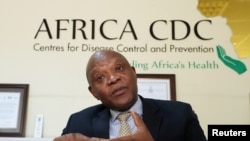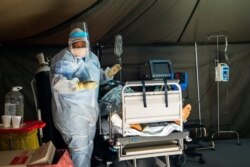Scientists in Africa are taking a proactive stance in the fight against the spread of the coronavirus, says the continent's top epidemiologist. Dr. John Nkengasong says that across the continent, scientists are doing genome sequencing, clinical testing and trying to find innovative ways to apply African knowledge to this global threat.
Africa was never going to escape the spread of the coronavirus, the continent’s top epidemiologist says. He adds that African scientists and doctors are applying lessons they learned from the continent’s battle with the HIV pandemic, and stepping up their role in the fight.
Dr. John Nkengasong, director of the African Centers for Disease Control and Prevention, says labs, epidemiologists and doctors are hard at work across the continent, which has now recorded more than 640,000 cases of COVID-19, the disease caused by the coronavirus. More than 6.5 million tests have been conducted, most of them in hotspot countries like South Africa, Egypt, Nigeria, Ghana and Algeria.
He said 64 clinical drug trials are currently happening, and South Africa is leading the continent’s first vaccine trial. Eventually, he said, if a successful vaccine is found, African countries should be allowed to produce and distribute it themselves.
“It is our strong belief that Africa should play an active role in the process of development of the vaccines and uptake of vaccines, and not wait until vaccines are developed before they are distributed in Africa. So we are positioning the continent to play a coordinated role to enhance and accelerate the clinical trials of any promising vaccine candidates on the continent,” said Dr. Nkengasong.
Additionally, he said, scientists are convening with traditional medicine practitioners to discuss how they can contribute, and the African CDC is supporting laboratories in Ethiopia, Senegal and Nigeria that are working to sequence the virus’s genome.
But, he said, the fight cannot be won by scientists alone. He laid out the continent’s plan of action.
“We need to ramp up testing. We need to trace those who are infected and isolate them and make provisions for appropriate treatment. The second thing we must do is to engage communities very actively. The battle against COVID-19 will be decided at a community level. And without proper community engagement, community ownership and response, we will not be able to conduct the appropriate contact tracing and care. And lastly, we are calling on all countries in Africa, member states, to ensure that we have a policy of universal masking. That is, we should all wear masks when we are in open, public places,” said Dr. Nkengasong.
While he and South African officials also noted that COVID-19 testing is improving -- both in terms of the number of tests, and in terms of the speed of results -- the number of confirmed cases is keeping pace. As of this week, he said, the continent is seeing an average of 17,000 new cases per day.





